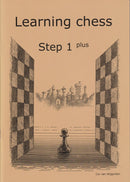Description
Learning Chess Workbook: Step 1 Plus - Cor Van Wijgerden
Learning Chess Workbook: Step 1 Plus - Cor Van Wijgerden
Learning Chess Workbook: Step 1 Plus - Cor Van Wijgerden
The Step-by-Step Method
Paperback, 56 pages
For many trainers the number of exercises in the ordinary workbooks is enough, but not for everyone. For many years there has been asked for 'more'. Therefore, next to the existing workbooks the Extra workbooks and the Plus workbooks have been published. The students will be able to do more exercises on almost the same level and consequently remain busy with the same step for a longer period. It is important that the difficulty level does not go up too quickly. The problem of proceeding (too) quickly to the next step, that a lot of children are not yet ready for, can be prevented in this way.
Why is Workbook Step 1 Plus important? Almost all the students are not yet able to play chess well enough even after finishing the workbook accompanying Step 1. In every game pieces are still being given away and pieces which have been left en prise by the opponent are not always being taken. They do not yet have a sufficiently good overview of what is happening on the board, i.e. they do not yet see all the possible attacking and defensive options. We must tackle this vision as our top priority, or else it will remain a serious weakness for longer than necessary. We should not deal with new material before the children have mastered the basics to a great enough degree. Watch carefully to be sure that they apply in their own games what they have learnt from the lessons and the exercises.
Should a child not spot immediately that one of the pieces is hanging, then it makes little sense to want to teach him to look for the double attack (Step 2) in his own games. If, during a game, someone is obliged to look carefully to see if a piece is en prise, then that person will certainly not spot that on the next move two pieces will be in danger! The best method for the improvement of children's board vision is to let them play games. It is helpful to remember that every child will require a different amount of time to master every phase (as defined in the introduction in the manual "How children learn to play chess"). One child may need to play 300 games, another one perhaps 1000. Of course, solving exercises also develops this overview of the board.
The contents of the Workbook Step 1 Plus
More or less new topics:
- Mate in one (discovered check, X-ray protection)
- Protecting (X-ray protection)
- Route planners Give check, go to the right square, trapping, capture all pieces (excellent exercises to improve the board vision)
- passed pawn
- Defending against mate
- Defending against a passed pawn
Elaborating the already introduced material:
- Defending - Different forms of protecting and moving away.
- Draw - Stalemate danger! Preventing and lifting the stalemate
- Mate in one Different forms of indirect protecting
- Creating mate - Different forms
- Defending against mate - Winning material, Van Wijgerden
Payment & Security
Your payment information is processed securely. We do not store credit card details nor have access to your credit card information.


